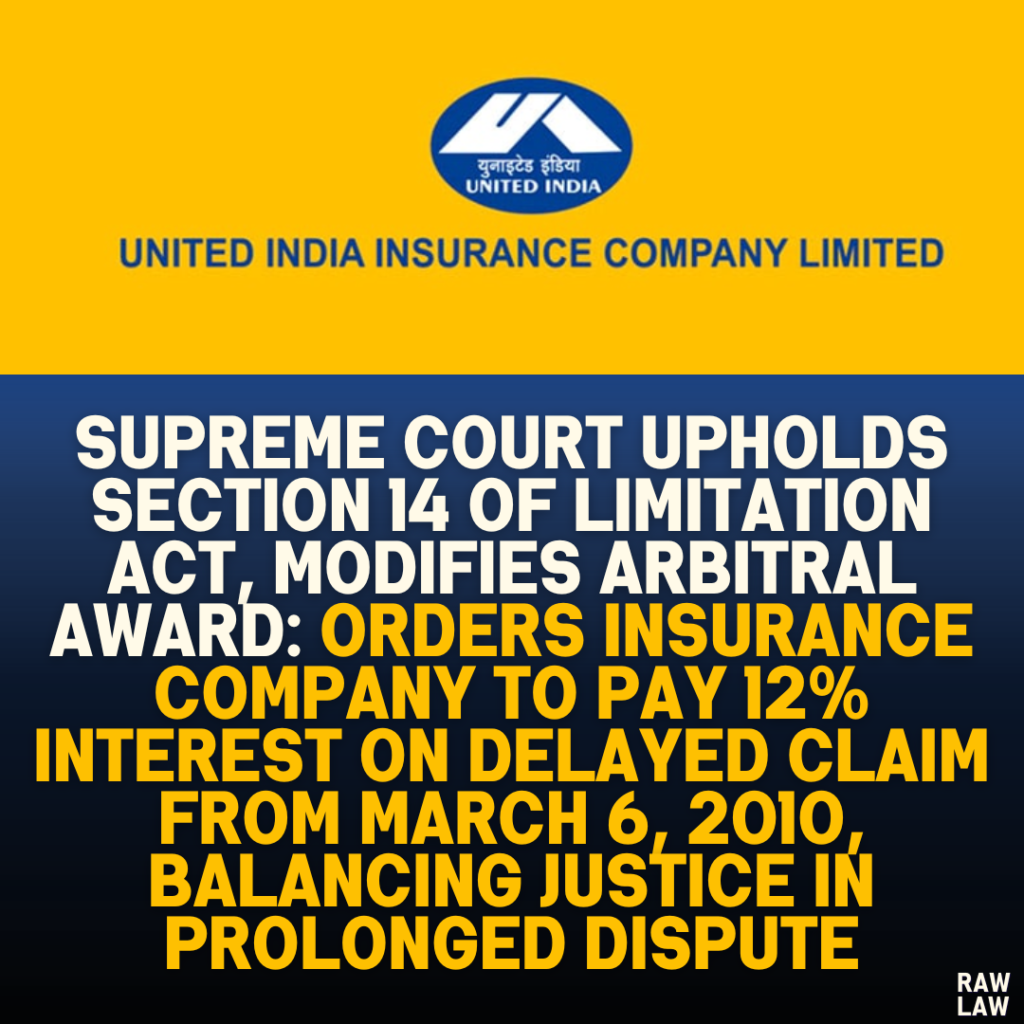Court’s Decision
The Supreme Court of India modified the arbitral award and the High Court’s judgment regarding the payment of interest on delayed insurance claims. It directed the insurance company (appellant) to pay interest at 12% per annum from March 6, 2010, when the Arbitral Tribunal held that the respondent’s claim was within time under Section 14 of the Limitation Act. The balance payment was to be made within four weeks.
Facts
- Background of the Dispute: The dispute arose when the respondent, an insured party, claimed compensation from the insurance company (appellant). The insurer refused to settle the claim, prompting the respondent to take legal action.
- Initial Steps Taken by the Respondent: The respondent pursued its claim before the National Consumer Disputes Redressal Commission (NCDRC) from January 21, 2003, to December 1, 2006. However, this process did not yield a favorable outcome.
- Arbitration Proceedings: The respondent subsequently invoked arbitration in December 2006. The arbitration process was delayed further, and the Arbitral Tribunal eventually ruled on March 6, 2010, that the claim was within time, relying on Section 14 of the Limitation Act. This section excludes the time spent pursuing legal remedies in a different forum when determining whether a claim is time-barred.
- Challenge by the Insurance Company: The insurance company challenged the Tribunal’s decision in the High Court, arguing that the respondent’s delays should preclude interest payments for the period of inactivity. The High Court dismissed the appeal, leading to the present Supreme Court case.
Issues
- Interest on Delayed Payments: Should the respondent be entitled to interest for periods where the delay was caused by its own actions, such as pursuing the claim before the NCDRC and other delays during arbitration?
- Limitation Period: Was the claim barred by limitation, or was the Arbitral Tribunal correct in excluding the period spent before the NCDRC under Section 14 of the Limitation Act?
Petitioner’s Arguments (Insurance Company)
- Delays by the Respondent: The insurance company contended that the respondent was responsible for significant delays:
- Over four years (2003–2006) while pursuing the claim before the NCDRC.
- Additional delays during arbitration proceedings, which began in 2006.
- Failure to Justify Interest: The company argued that both the Tribunal and the High Court failed to provide reasons for awarding interest for periods attributable to the respondent’s delay.
- Limitation Defense: The insurance company also raised the argument that the respondent’s claim was time-barred.
Respondent’s Arguments (Insured Party)
- Seeking Legal Remedies: The respondent asserted that it was compelled to pursue legal remedies, first through the NCDRC and later via arbitration, due to the insurer’s failure to honor its contractual obligations.
- Exclusion of Time under Section 14 of the Limitation Act: The respondent emphasized that the time spent pursuing the claim before the NCDRC was rightly excluded by the Tribunal under Section 14, and the claim was, therefore, within the limitation period.
- Right to Interest: The respondent argued that the insurance company, having failed to settle the claim promptly, could not deny liability for interest on the delayed payment.
Analysis of the Law
- Section 14 of the Limitation Act: The Court examined the application of this provision, which allows for the exclusion of time spent in pursuing a claim in a forum with no jurisdiction. The Tribunal had rightly applied this section to exclude the period (2003–2006) spent before the NCDRC.
- Interest on Delayed Payments: The Court recognized that justice demanded a fair approach to interest payments. While the respondent’s delays could not be entirely disregarded, the insurer’s refusal to pay the claim justified awarding interest from March 6, 2010, the date when the Tribunal resolved the limitation issue.
Precedent Analysis
The Court considered previous judgments on:
- Application of Section 14 of the Limitation Act: These rulings supported the exclusion of time spent in bona fide pursuit of remedies in another forum.
- Interest on Delayed Payments: Case law emphasized that interest serves as compensation for the delayed use of money and should balance the rights of both parties.
Court’s Reasoning
- Balance of Justice: The Court acknowledged that the respondent contributed to delays but noted that these delays were partly due to its need to seek legal remedies. The insurer, on the other hand, had failed to honor its contractual obligation, leading to prolonged litigation.
- Modified Interest Payment: To ensure fairness, the Court awarded interest from March 6, 2010, when the Tribunal ruled the claim was within time. This date reflected the point at which the respondent’s claim gained legitimacy under the law.
Conclusion
The Supreme Court modified the High Court’s judgment and the Arbitral Award:
- Interest was awarded at 12% per annum from March 6, 2010.
- The appellant-insurance company was directed to make the balance payment within four weeks.
Implications
- Clarification of Legal Remedies: The judgment reinforces the application of Section 14 of the Limitation Act, ensuring that parties are not penalized for seeking remedies in forums with no jurisdiction.
- Fairness in Contractual Disputes: The ruling underscores the importance of balancing delays caused by parties against the obligation to fulfill contractual duties.
- Interest as Compensation: The decision highlights the Court’s commitment to providing equitable relief in cases of delayed payments.
This judgment serves as a precedent for similar disputes, providing guidance on applying limitation laws and determining interest liability.
